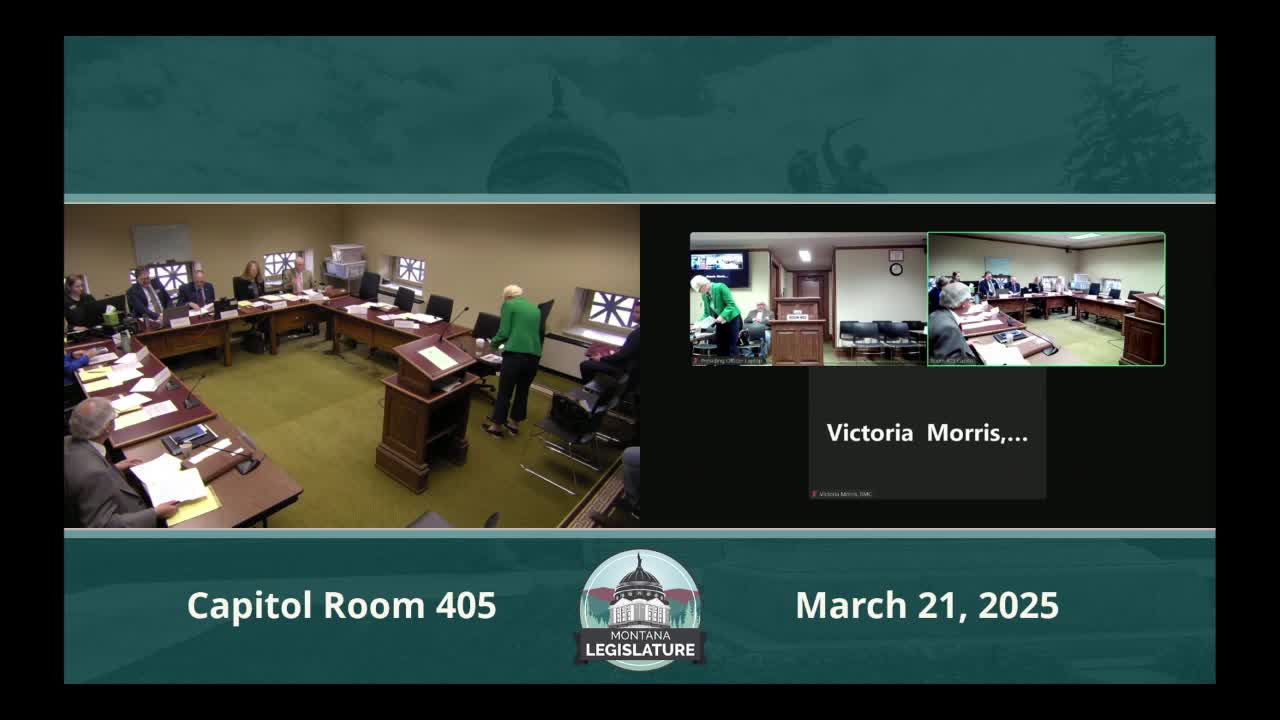Senate Tax Committee hears bill to lower disability threshold for Montana veterans’ property-tax reduction
Get AI-powered insights, summaries, and transcripts
Subscribe
Summary
Senate Bill 424 would expand eligibility for Montana’s disabled-veteran property-tax reduction from 100% VA disability to a 60–90% band with scaled benefits; sponsors and veterans groups said the change would align Montana with neighboring states, while state fiscal staff outlined estimated costs and program rules.
Senate Bill 424, introduced by Senator Ellie Boldman, was heard Wednesday by the Montana Legislature’s Senate Tax Committee. The bill would change eligibility for Montana’s Disabled Veterans Assistance program so that veterans rated by the U.S. Department of Veterans Affairs at 60–90 percent service‑connected disability could receive a reduced property‑tax benefit; current law requires a 100 percent rating.
The proposal’s sponsor said the change is intended to match Montana with most neighboring states and extend relief to veterans who are substantially, though not completely, rated disabled by the VA. "All my bill does is sort of, put us at a pretty conservative matching to some of our surrounding states," Senator Ellie Boldman said during her opening remarks.
Committee members heard testimony from veterans and veterans’ groups who urged support. Duane Cunningham, adjutant for the American Legion of Montana and a retired Navy veteran, told the committee, "This is a good bill because it opens a whole lot of doors when a veteran is getting ready to get out of the service." Roger Hagan, who testified as a private citizen and said he was recently appointed to the Board of Veterans Affairs, cited the state constitution’s direction that veterans may receive special consideration and said broader eligibility could attract military retirees to Montana.
State staff described how the bill would change benefit levels and the program’s pool of eligible recipients. Bryce Kaatz, bureau chief with the Property Assessment Division, said the bill would lower the threshold from 100 percent to 60 percent and adjust the benefit tiers: veterans rated 60–90 percent who meet the program’s income limits would receive a 50 percent reduction rather than the current 100 percent benefit reserved for 100 percent‑rated veterans. Kaatz told the committee, "In the fiscal note, we estimate around 5,400, just under 5,500 additional people would qualify," a projection based on national VA disability statistics applied to Montana.
Kaatz also summarized current program enrollment and fiscal impacts from the fiscal note: "There are 3,400 enrolled in the current Montana Disabled Veterans Program. That's about a $1.5 million hit to the SCEPTER account ... and about a $6.5 million statewide shift to all other property owners," he said, noting that the local impacts would vary by county depending on the concentration of eligible parcels.
Kaatz clarified surviving‑spouse rules: a surviving spouse of a qualifying veteran remains eligible if unmarried and meeting income thresholds. Committee members asked staff about data availability; Kaatz said Montana does not maintain detailed public records tying veterans to specific disability ratings in the state.
Supporters emphasized practical and recruitment effects. "This will be a good one. We would open a few eyes that, hey, I don't have to be 100% service connected to get a tax break on my property taxes," Duane Cunningham said. Senator Boldman said the change would have a fairly small fiscal impact while aligning Montana with other Western states.
The hearing closed without a committee vote on Senate Bill 424; committee staff indicated the fiscal note and additional information would be available ahead of any future executive action.
The committee proceeded to other business after closing SB 424’s hearing.
